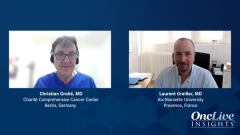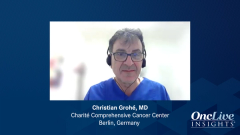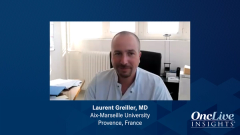
Real-World Data and Observed AEs With Frontline Chemo IO Therapy in SCLC
Laurent Greiller, MD, and Christian Grohé, MD, consider real-world data and adverse events observed with frontline chemoimmunotherapy in small cell lung cancer.
Episodes in this series

Transcript:
Christian Grohé, MD: To continue from here, we have real-world data from Spain. The Spanish colleagues very often have good registries and have a fine cooperation within Spain. What do you think about the CANTABRICO data which have been published?
Laurent Greiller, MD: First of all, I would like to say that I’m very interested in this real-world data because it’s very important. Notably, in thoracic oncology, to make sure that the results from randomized clinical trials are still the same for the patients we are treating in routine practice. The CANTABRICO study [NCT04712903] is a phase 3b study. It’s a single-arm multicenter study that was conducted in Spain. The eligible patients were treatment-naïve patients with extensive-stage small cell lung cancer. There were performance [statuses] from 0 to 2, which is a difference with randomized clinical trials we mentioned before. These patients were treated with durvalumab, plus platinum [chemotherapy] and etoposide. The total number of patients of the CANTABRICO study was around 100. It’s very interesting to note that the ASA, response rate, median PFS [progression-free survival], and safety outcomes were very similar to what was observed in the CASPIAN trial. Also, this randomized phase 3 trial, CASPIAN [NCT03043872], was conducted in selected patients. It’s very interesting to see that the real-world data confirms the results of the randomized phase 3 trial.
Christian Grohé, MD: Laurent, that’s very interesting. Would you think that, showing the real-world data, if you take 100 patients who have been treated with triple therapy, is there still the same kind of signal that there are some patients who have a very high benefit and there are some patients who have no benefit? Do you think this is something that we do encounter in this cohort of patients? Does triple IO [immunotherapy] work fine for everybody?
Laurent Greiller, MD:I agree with you. IO doesn’t work for everybody the same. Some patients experience benefits, [while] others do not experience any benefits and can experience toxicities. So we have to make it better in terms of patient selection, to select the good patients for IO, the bad patients for IO, and we have to improve our selection in the future, it’s absolutely necessary. What’s also interesting with real-world data is that we can more easily compare it with randomized clinical trials. We can more easily assess the role of the sequences of treatments, and to [choose] what treatment is given after the first line, and are there some sequences that are better for some patients and other sequences better for other patients? [With the] data from the real world, I think more interesting is that the results of clinical trials are always limited to 1 line of treatment.
Christian Grohé, MD: I think that’s an important part of our daily business to have registry data. But you mentioned toxicity. Overall, I personally see [that] toxicities associated with PD-L1 inhibitors like durvalumab or atezolizumab seem to be less aggressive and not as frequent as we do see with classical PD-L1 inhibitors like pembrolizumab. We do get more complex adverse events than we have seen with other first-line treatment in non–small cell lung cancer. In particular, we have also seen problems with CTLA-4 antagonists like ipilimumab, which usually are not a standard of care in small cell lung cancers. So toxicity is manageable because we now have a lot of expertise with PD-L1 inhibitors in our patients. The rate of pneumonitis or other [adverse] effects are not as bad as we anticipated. What’s really interesting is at the very beginning we thought that patients who had paraneoplastic syndrome would be very sensitive to the use of IO, but it’s the other way around. Obviously, they have a very active immune system, and they don’t really have a higher incidence or prevalence of problems, at least, what we have seen in our patients. We try to manage these patients. Maybe we have a better view [of] these patients. We watch these patients closer these days to make sure that these patients are under good control.
Transcript edited for clarity.






































